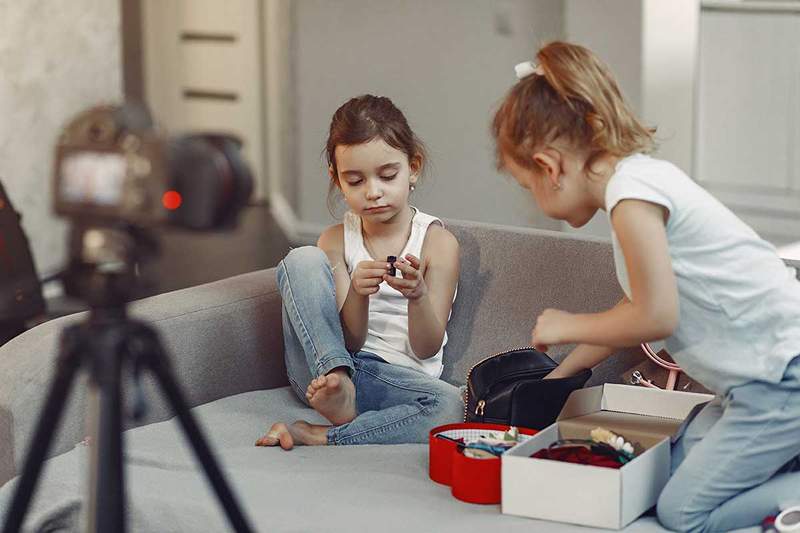Shanting, overexpose our children in the networks

- 2059
- 271
- John Von
Verónica and Jaime practice the Sharenting. Every day you upload photos and stories of your 3 -year -old daughter to social networks. The followers of their networks can see their daughter while sleeping, while having breakfast, while playing, while eats, etc. Each movement and every action that your daughter does consider it worthy of portraying it and uploading it to social networks. In a month they can publish up to one hundred or two hundred photos - or more - of their 3 -year -old girl. Do this type of stories sound to the reader? Let's see what the Sharenting And what consequences can.
Content
Toggle- Sharenting
- Consequences
- A responsible attitude
- Final reflection
- Bibliography
Sharenting
Sharenting is a word composed of English origin. Comes from Compartir, Share and parenting, paternity. It is about sharing excessively on social networks the day to day of the little ones. It is a practice that has become quite normal, however, the fact that it has normalized is not synonymous with it being beneficial. What consequences can you share so much information about the little ones? Where is your privacy? Are the rights of children being violated?
Consequences
- Future emotions of the little ones. What will children think when they see their photos within a few years? It is important to keep in mind that children will not always be small and In the future they can negatively react to the overexposure to which they have been exposed.
- Network learning. What are we teaching the little ones about the use of networks? Children learn, above all, by imitation and if since childhood parents overexpose them on social networks, they will possibly learn that this type of overexposure is normal, so what use of networks in the future? Will they be a showcase of their lives? Are we creating a false reality? Will their self -esteem base on the comments and the "like" you receive on the networks? Will we be creating a likes?
- Exposure to everyone and fingerprint. When we hang a photo or a video on the Internet we lose power over it. Anyone can take it and although we will erase it later that photo will already be in possession of other people. And what intentions can third parties have? We do not know, but there can be cases of extortion. Thus, It is important to take into account the fingerprint that we leave and to whom we expose the life of our children.
- Right to privacy and privacy. It would be somewhat surreal to ask a one -year -? If it says a word. Even if the children are 3, 4 or 5 years old and ask for their consent, they really do not know the consequences of being so exposed. Thus, The parents have to be those who ensure their intimacy and privacy. Many times data are hung that can be used by third parties: what school goes, hobbies, where is it and what it does at all times, where it lives ... although these data may seem irrelevant, there is the possibility that they use them against us.
 Effects of child abuse in the brain
Effects of child abuse in the brain A responsible attitude
Next, three points are exposed on which it is important to reflect before flooding our social network with our child's face:
- The child belongs to his parents, but this is not synonymous with the fact that they must publish everything they do throughout the day. The parents are responsible for the exposure of their children on social networks since The little one is not yet able to decide for himself. Thus, it is important to reflect on the child's privacy and the use we are making of his image.
- If we want to share images of our children, Why not do it through private messages?
- It is key to think if we really expose our children so that others see it or to fill our social networks with "Like" and hearts. The child is not aware of what is happening on the Internet, but the parents do. Thus, It is possible to end up being addicted to the "likes" using our children for it.
Final reflection
Although parents are not aware of the medium and long term effect of Sharenting It is important to realize that the child will be big one day and may not be proud of what their parents have exposed. In fact, They can feel shame, sadness, anxiety and concern. Above all, we must bear in mind that the sharing of children ceases to be our. That is, although the child grows and erase everything, there are people who have been able to keep that information. What will our child feel and think about the future if you want to delete your network data but your parents have overexposed them?
On the other hand, we fall into the danger of teaching our children a dysfunctional relationship with social networks, this is, that your self -esteem depends on the approval of others. Our children must learn a healthy relationship with new technologies, so it is essential to control their use and not forget that children like to run and play with friends of their age. As the FCO team stands out. Javier Hinojo in an investigation carried out in 2020 on the Sharenting: Adults often do not take into account the perspective of the other, since photographs have sensitive information that can generate feelings of shame and frustration in those affected.
In this way, the lack of empathy of many parents towards their children in favor of direct social networks is revealed. The fennel team also points out that Spanish adults surveyed are not aware of The irrigation that this type of practices for the safety of the minor. Thus, it is necessary to see what consequences the excessive exhibition of our children can have before carrying it out.
Bibliography
- Fennel, f.J. et al. (2020). Sharenting: Internet addiction, self -control and online photographs of minors. Communicate, 64 (28), 97-108.

